Lionel Messi Height Weight Age Biography Family Wiki Net Worth, Affairs, Marriage & much more. Lionel Andrés Messi (born 24 June 1987), also known as Leo Messi, is an Argentine professional footballer who plays as a forward for Ligue 1 club Paris Saint-Germain and captains the Argentina national team. Often considered the best player in the world and widely regarded as one of the greatest players of all time, Messi has won a record seven Ballon d’Or awards, a record six European Golden Shoes, and in 2020 was named to the Ballon d’Or Dream Team. Until leaving the club in 2021, he had spent his entire professional career with Barcelona, where he won a club-record 35 trophies, including ten La Liga titles, seven Copa del Rey titles and four UEFA Champions Leagues. A prolific goalscorer and creative playmaker, Messi holds the records for most goals in La Liga (474), a La Liga and European league season (50), most hat-tricks in La Liga (36) and the UEFA Champions League (8), and most assists in La Liga (192), a La Liga season (21) and the Copa América (17). He also holds the record for most international goals by a South American male (81). Messi has scored over 750 senior career goals for club and country, and has the most goals by a player for a single club.
Born and raised in central Argentina, Messi relocated to Spain to join Barcelona at age 13, for whom he made his competitive debut aged 17 in October 2004. He established himself as an integral player for the club within the next three years, and in his first uninterrupted season in 2008–09 he helped Barcelona achieve the first treble in Spanish football; that year, aged 22, Messi won his first Ballon d’Or. Three successful seasons followed, with Messi winning four consecutive Ballons d’Or, making him the first player to win the award four times and in a row. During the 2011–12 season, he set the La Liga and European records for most goals scored in a single season, while establishing himself as Barcelona’s all-time top scorer. The following two seasons, Messi finished second for the Ballon d’Or behind Cristiano Ronaldo (his perceived career rival), before regaining his best form during the 2014–15 campaign, becoming the all-time top scorer in La Liga and leading Barcelona to a historic second treble, after which he was awarded a fifth Ballon d’Or in 2015. Messi assumed captaincy of Barcelona in 2018, and in 2019 he won a record sixth Ballon d’Or. Out of contract, he signed for Paris Saint-Germain in August 2021.
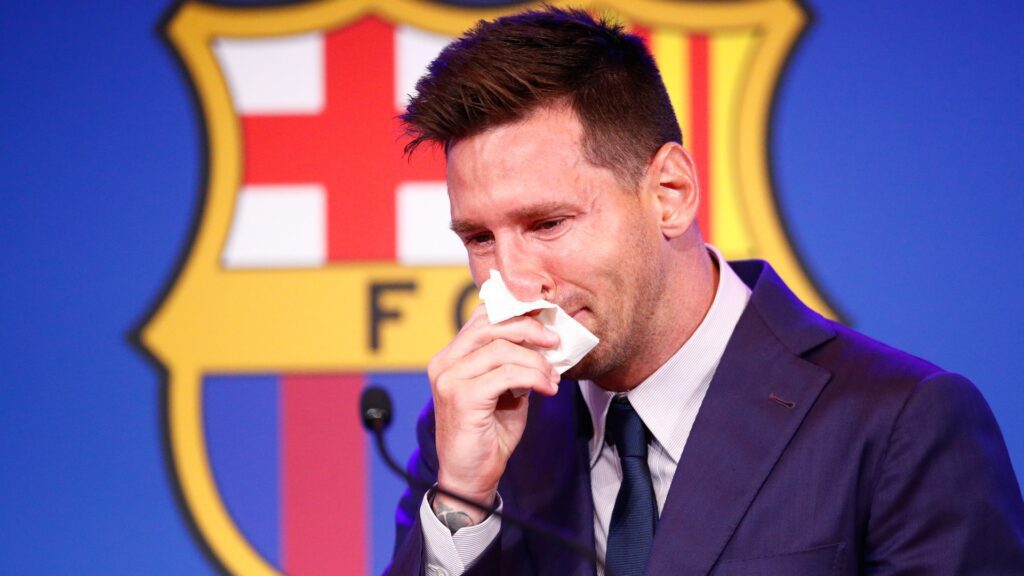
An Argentine international, Messi is both his country’s highest appearance-maker and their all-time leading goalscorer. At youth level, he won the 2005 FIFA World Youth Championship, finishing the tournament with both the Golden Ball and Golden Shoe, and an Olympic gold medal at the 2008 Summer Olympics. His style of play as a diminutive, left-footed dribbler drew comparisons with his compatriot Diego Maradona, who described Messi as his successor. After his senior debut in August 2005, Messi became the youngest Argentine to play and score in a FIFA World Cup in 2006, and reached the final of the 2007 Copa América, where he was named young player of the tournament. As the squad’s captain from August 2011, he led Argentina to three consecutive finals: the 2014 FIFA World Cup, for which he won the Golden Ball, and the 2015 and 2016 Copa América, winning the Golden Ball in the 2015 edition. After announcing his international retirement in 2016, he reversed his decision and led his country to qualification for the 2018 FIFA World Cup, a third-place finish at the 2019 Copa América, and won the 2021 Copa América, while winning the Golden Ball and Golden Boot award for the latter. This achievement would see him receive a record seventh Ballon d’Or in 2021.
Messi has endorsed sportswear company Adidas since 2006. According to France Football, he was the world’s highest-paid footballer for five years out of six between 2009 and 2014, and was ranked the world’s highest-paid athlete by Forbes in 2019. Messi was among Time’s 100 most influential people in the world in 2011 and 2012. In February 2020, he was awarded the Laureus World Sportsman of the Year, thus becoming the first footballer and the first team sport athlete to win the award. Later that year, Messi became the second footballer (and second team-sport athlete) to surpass $1 billion in career earnings.
Early life
Messi was born on 24 June 1987 in Rosario, Santa Fe, the third of four children of Jorge Messi, a steel factory manager, and his wife Celia Cuccittini, who worked in a magnet manufacturing workshop. On his father’s side, he is of Italian and Spanish descent, the great-grandson of immigrants from the northcentral Adriatic Marche region of Italy and Catalonia, and on his mother’s side, he has primarily Italian ancestry. Growing up in a tight-knit, football-loving family, “Leo” developed a passion for the sport from an early age, playing constantly with his older brothers, Rodrigo and Matías, and his cousins, Maximiliano and Emanuel Biancucchi, both of whom became professional footballers. At the age of four he joined local club Grandoli, where he was coached by his father, though his earliest influence as a player came from his maternal grandmother, Celia, who accompanied him to training and matches. He was greatly affected by her death, shortly before his eleventh birthday; since then, as a devout Catholic, he has celebrated his goals by looking up and pointing to the sky in tribute to his grandmother.
“When you saw him you would think: this kid can’t play ball. He’s a dwarf, he’s too fragile, too small. But immediately you’d realize that he was born different, that he was a phenomenon and that he was going to be something impressive.”
– Newell’s Old Boys youth coach Adrián Coria shares his first impression of the 12-year-old Messi.
A lifelong supporter of Newell’s Old Boys, Messi joined the Rosario club when he was six years old. During the six years he played for Newell’s, he scored almost 500 goals as a member of “The Machine of ’87”, the near-unbeatable youth side named for the year of their birth, and regularly entertained crowds by performing ball tricks during half-time of the first team’s home games. However, his future as a professional player was threatened when, at age 10, he was diagnosed with a growth hormone deficiency. As his father’s health insurance covered only two years of growth hormone treatment, which cost at least $1,000 per month, Newell’s agreed to contribute, but later reneged on their promise. He was scouted by Buenos Aires club River Plate, whose playmaker, Pablo Aimar, he idolised, but they were also unable to pay for his treatment due to Argentina’s economic collapse. His goalscoring idol growing up was Ronaldo, with Messi calling him “the best forward I’ve ever seen”.
Messi enrolled at Barcelona’s youth academy, La Masia, at age 13.
As the Messi family had relatives in Catalonia, they sought to arrange a trial with Barcelona in September 2000. First team director Charly Rexach immediately wanted to sign him, but the board of directors hesitated; at the time it was highly unusual for European clubs to sign foreign players of such a young age. On 14 December, an ultimatum was issued for Barcelona to prove their commitment, and Rexach, with no other paper at hand, offered a contract on a paper napkin. In February 2001, the family relocated to Barcelona, where they moved into an apartment near the club’s stadium, Camp Nou. During his first year in Spain, Messi rarely played with the Infantiles due to a transfer conflict with Newell’s; as a foreigner, he could only be fielded in friendlies and the Catalan league. Without football, he struggled to integrate into the team; already reserved by nature, he was so quiet that his teammates initially believed he was mute. At home, he suffered from homesickness after his mother moved back to Rosario with his brothers and little sister, María Sol, while he stayed in Barcelona with his father.
After a year at Barcelona’s youth academy, La Masia, Messi was finally enrolled in the Royal Spanish Football Federation (RFEF) in February 2002. Now playing in all competitions, he befriended his teammates, among whom were Cesc Fàbregas and Gerard Piqué. After completing his growth hormone treatment aged 14, Messi became an integral part of the “Baby Dream Team”, Barcelona’s greatest-ever youth side. During his first full season (2002–03), he was top scorer with 36 goals in 30 games for the Cadetes A, who won an unprecedented treble of the league and both the Spanish and Catalan cups. The Copa Catalunya final, a 4–1 victory over Espanyol, became known in club lore as the Partido de la máscara, the final of the mask. A week after suffering a broken cheekbone during a league match, Messi was allowed to start the game on the condition that he wear a plastic protector; soon hindered by the mask, he took it off and scored two goals in 10 minutes before his substitution. At the close of the season, he received an offer to join Arsenal, his first from a foreign club, but while Fàbregas and Piqué soon left for England, he chose to remain in Barcelona.
Lionel Messi Height Weight Age Girlfriend Body Statistics & Biography
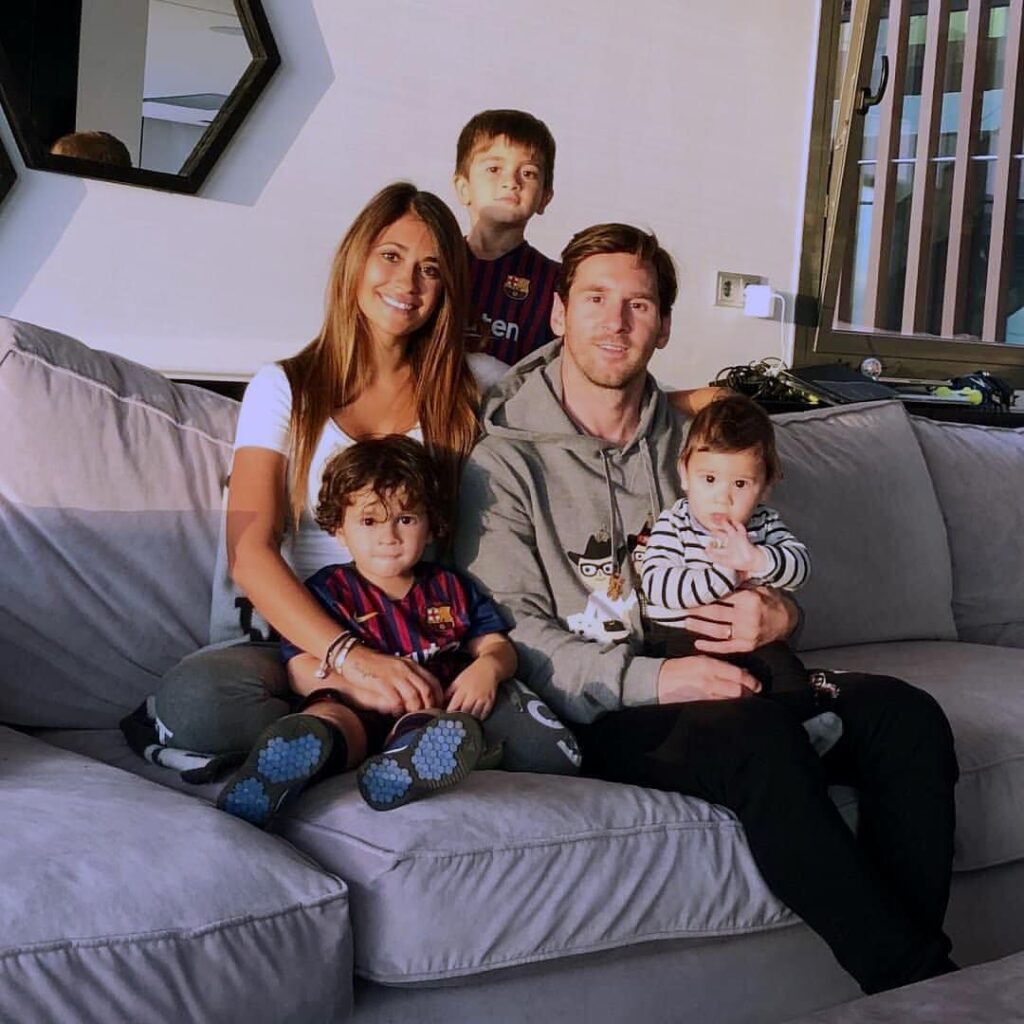
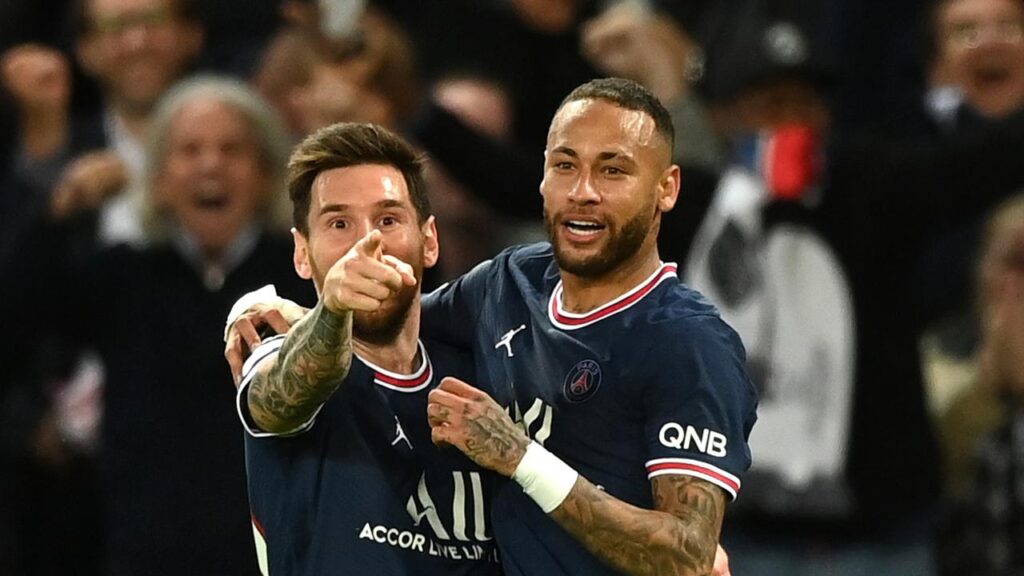
Personal life
Since 2008, Messi has been in a relationship with Antonela Roccuzzo, a fellow native of Rosario. He has known Roccuzzo since he was five years old, as she is the cousin of his childhood best friend, Lucas Scaglia, who is also a football player. After keeping their relationship private for a year, Messi first confirmed their romance in an interview in January 2009, before going public a month later during a carnival in Sitges after the Barcelona–Espanyol derby.
“Leo is not shy. He’s introverted. He’s reserved.”
— Endocrinologist Diego Schwarzstein, who addressed Messi’s growth hormone deficiency from 1997 to 2001.
Messi and Roccuzzo have three sons: Thiago (born 2012), Mateo (born 2015) and Ciro (born 2018). To celebrate his partner’s first pregnancy, Messi placed the ball under his shirt after scoring in Argentina’s 4–0 win against Ecuador on 2 June 2012, before confirming the pregnancy in an interview two weeks later. Thiago was born in Barcelona on 2 November 2012, with Messi attending the birth after being given permission by Barcelona to miss training. Thiago’s name and handprints are tattooed on his left calf. In April 2015, Messi confirmed that they were expecting another child. He missed training ahead of a match against Atlético Madrid to attend the birth of his second son, Mateo, on 11 September 2015 in Barcelona. On 30 June 2017, he married Roccuzzo at a luxury hotel named Hotel City Center in Rosario with about 260 guests attending his wedding. On 15 October 2017, his wife announced they were expecting their third child. On 10 March 2018, Messi skipped the match against Málaga after Ciro was born.
Messi enjoys a close relationship with his immediate family members, particularly his mother, Celia, whose face he has tattooed on his left shoulder. His professional affairs are largely run as a family business: his father, Jorge, has been his agent since he was 14, and his oldest brother, Rodrigo, handles his daily schedule and publicity. His mother and other brother, Matías, manage his charitable organization, the Leo Messi Foundation, and take care of personal and professional matters in Rosario.
Since leaving for Spain at age 13, Messi has maintained close ties to his hometown of Rosario, even preserving his distinct Rosarino accent. He has kept ownership of his family’s old house, although it has long stood empty; he maintains a penthouse apartment in an exclusive residential building for his mother, as well as a family compound just outside the city. Once when he was in training with the national team in Buenos Aires, he made a three-hour trip by car to Rosario immediately after practice to have dinner with his family, spent the night with them, and returned to Buenos Aires the next day in time for practice. Messi keeps in daily contact via phone and text with a small group of confidants in Rosario, most of whom were fellow members of “The Machine of ’87” at Newell’s Old Boys. He currently lives in Castelldefels, a village near Barcelona. Although considered a one-club man, he has long planned to return to Rosario to end his playing career at Newell’s. He was on bad terms with the club after his transfer to Barcelona, but by 2012 their public feud had ended, with Newell’s embracing their ties with Messi, even issuing a club membership card to his newborn son.
Career Statistics
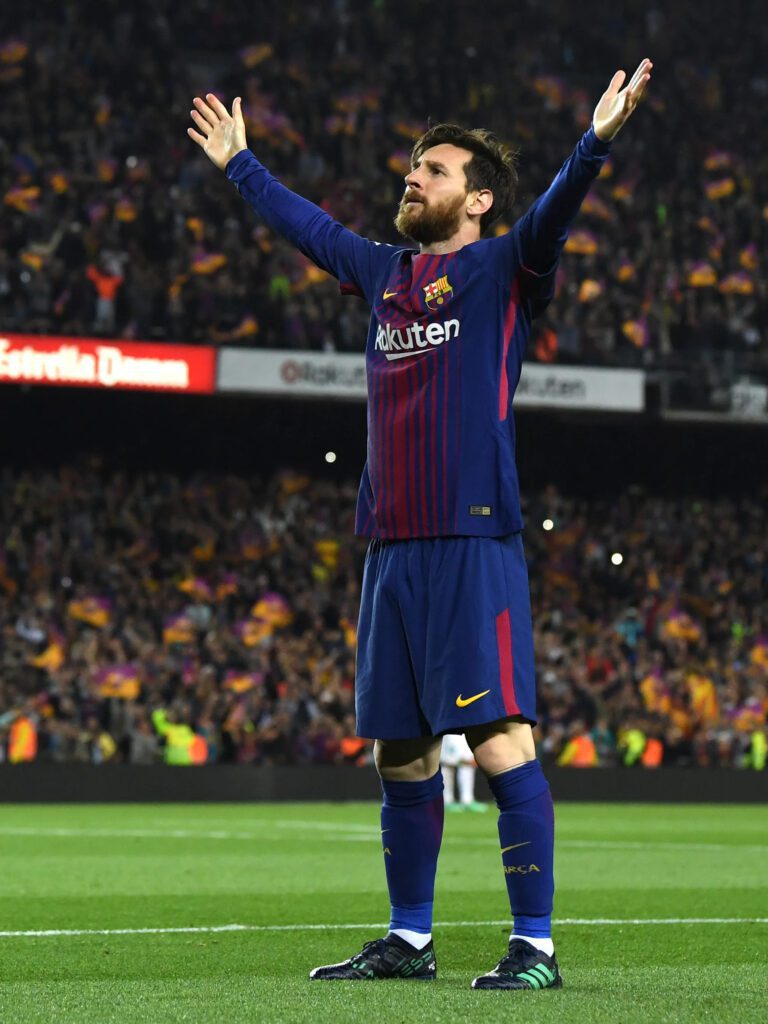
Club
| Club | Season | League | National Cup | Europe | Other | Total | |||||
|---|---|---|---|---|---|---|---|---|---|---|---|
| Division | Apps | Goals | Apps | Goals | Apps | Goals | Apps | Goals | Apps | Goals | |
| Barcelona C | 2003–04 | Tercera División | 10 | 5 | — | — | — | 10 | 5 | ||
| Barcelona B | 2003–04 | Segunda División B | 5 | 0 | — | — | — | 5 | 0 | ||
| 2004–05 | Segunda División B | 17 | 6 | — | — | — | 17 | 6 | |||
| Total | 22 | 6 | — | — | — | 22 | 6 | ||||
| Barcelona | 2004–05 | La Liga | 7 | 1 | 1 | 0 | 1 | 0 | — | 9 | 1 |
| 2005–06 | La Liga | 17 | 6 | 2 | 1 | 6 | 1 | 0 | 0 | 25 | 8 |
| 2006–07 | La Liga | 26 | 14 | 2 | 2 | 5 | 1 | 3 | 0 | 36 | 17 |
| 2007–08 | La Liga | 28 | 10 | 3 | 0 | 9 | 6 | — | 40 | 16 | |
| 2008–09 | La Liga | 31 | 23 | 8 | 6 | 12 | 9 | — | 51 | 38 | |
| 2009–10 | La Liga | 35 | 34 | 3 | 1 | 11 | 8 | 4 | 4 | 53 | 47 |
| 2010–11 | La Liga | 33 | 31 | 7 | 7 | 13 | 12 | 2 | 3 | 55 | 53 |
| 2011–12 | La Liga | 37 | 50 | 7 | 3 | 11 | 14 | 5 | 6 | 60 | 73 |
| 2012–13 | La Liga | 32 | 46 | 5 | 4 | 11 | 8 | 2 | 2 | 50 | 60 |
| 2013–14 | La Liga | 31 | 28 | 6 | 5 | 7 | 8 | 2 | 0 | 46 | 41 |
| 2014–15 | La Liga | 38 | 43 | 6 | 5 | 13 | 10 | — | 57 | 58 | |
| 2015–16 | La Liga | 33 | 26 | 5 | 5 | 7 | 6 | 4 | 4 | 49 | 41 |
| 2016–17 | La Liga | 34 | 37 | 7 | 5 | 9 | 11 | 2 | 1 | 52 | 54 |
| 2017–18 | La Liga | 36 | 34 | 6 | 4 | 10 | 6 | 2 | 1 | 54 | 45 |
| 2018–19 | La Liga | 34 | 36 | 5 | 3 | 10 | 12 | 1 | 0 | 50 | 51 |
| 2019–20 | La Liga | 33 | 25 | 2 | 2 | 8 | 3 | 1 | 1 | 44 | 31 |
| 2020–21 | La Liga | 35 | 30 | 5 | 3 | 6 | 5 | 1 | 0 | 47 | 38 |
| Total | 520 | 474 | 80 | 56 | 149 | 120 | 29 | 22 | 778 | 672 | |
| Paris Saint-Germain | 2021–22 | Ligue 1 | 25 | 6 | 1 | 0 | 7 | 5 | — | 33 | 11 |
| Career total | 577 | 491 | 81 | 56 | 156 | 125 | 29 | 22 | 843 | 694 |
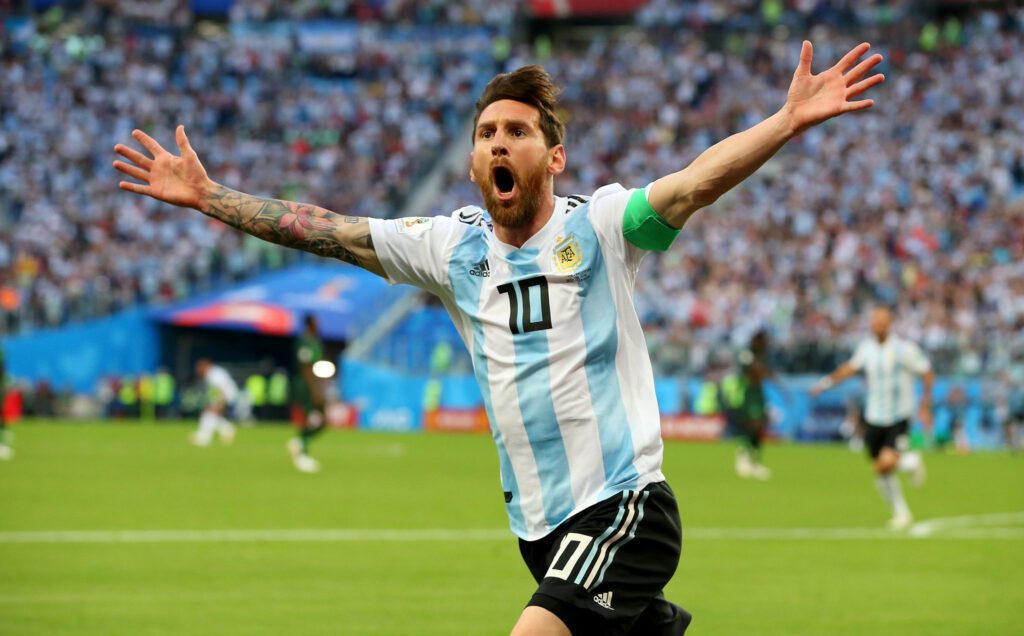
International
| Team | Year | Competitive | Friendly | Total | |||
|---|---|---|---|---|---|---|---|
| Apps | Goals | Apps | Goals | Apps | Goals | ||
| Argentina U20 | 2004 | — | 2 | 3 | 2 | 3 | |
| 2005 | 16 | 11 | — | 16 | 11 | ||
| Total | 16 | 11 | 2 | 3 | 18 | 14 | |
| Argentina U23 | 2008 | 5 | 2 | — | 5 | 2 | |
| Total | 5 | 2 | 0 | 0 | 5 | 2 | |
| Argentina | 2005 | 3 | 0 | 2 | 0 | 5 | 0 |
| 2006 | 3 | 1 | 4 | 1 | 7 | 2 | |
| 2007 | 10 | 4 | 4 | 2 | 14 | 6 | |
| 2008 | 6 | 1 | 2 | 1 | 8 | 2 | |
| 2009 | 8 | 1 | 2 | 2 | 10 | 3 | |
| 2010 | 5 | 0 | 5 | 2 | 10 | 2 | |
| 2011 | 8 | 2 | 5 | 2 | 13 | 4 | |
| 2012 | 5 | 5 | 4 | 7 | 9 | 12 | |
| 2013 | 5 | 3 | 2 | 3 | 7 | 6 | |
| 2014 | 7 | 4 | 7 | 4 | 14 | 8 | |
| 2015 | 6 | 1 | 2 | 3 | 8 | 4 | |
| 2016 | 10 | 8 | 1 | 0 | 11 | 8 | |
| 2017 | 5 | 4 | 2 | 0 | 7 | 4 | |
| 2018 | 4 | 1 | 1 | 3 | 5 | 4 | |
| 2019 | 6 | 1 | 4 | 4 | 10 | 5 | |
| 2020 | 4 | 1 | 0 | 0 | 4 | 1 | |
| 2021 | 16 | 9 | 0 | 0 | 16 | 9 | |
| 2022 | 2 | 1 | 0 | 0 | 2 | 1 | |
| Total | 113 | 47 | 47 | 34 | 160 | 81 | |
| Career total | 134 | 60 | 49 | 37 | 183 | 97 |

1 Comment
Add a Comment